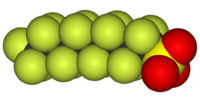
Photo from wikipedia
Emamectin benzoate (EMB) is an insecticide extensively used in agricultural area. Assessing the toxic effects of EMB in mammals or humans and its endogenous metabolites alteration are the appropriate means… Click to show full abstract
Emamectin benzoate (EMB) is an insecticide extensively used in agricultural area. Assessing the toxic effects of EMB in mammals or humans and its endogenous metabolites alteration are the appropriate means of evaluating its risks to human health. In the study, THP‐1 macrophage, a human immune model, was applied to investigate the immunotoxicity of EMB. A global metabolomics approach was developed to analyze metabolic perturbation on macrophages and discover the potential biomarkers of EMB‐induced immunotoxicity. The results indicated that EMB could inhibit immune functions of macrophages. Based on metabolomics analysis, our results illustrated that EMB caused significant alterations in metabolic profiles on macrophages. 22 biomarkers associated with immune response were screened by pattern recognition and multivariate statistical analysis. Furthermore, pathway analysis identified purine metabolism was the most relevant pathway in the metabolic process and the abnormal conversion of AMP to xanthosine regulated by NT5E might be a potential mechanism of immunotoxicity induced by EMB. Our study provides important insights for understanding and underlying mechanism of immunotoxicity exposed to EMB.
Journal Title: Environmental Toxicology
Year Published: 2023
Link to full text (if available)
Share on Social Media: Sign Up to like & get
recommendations!